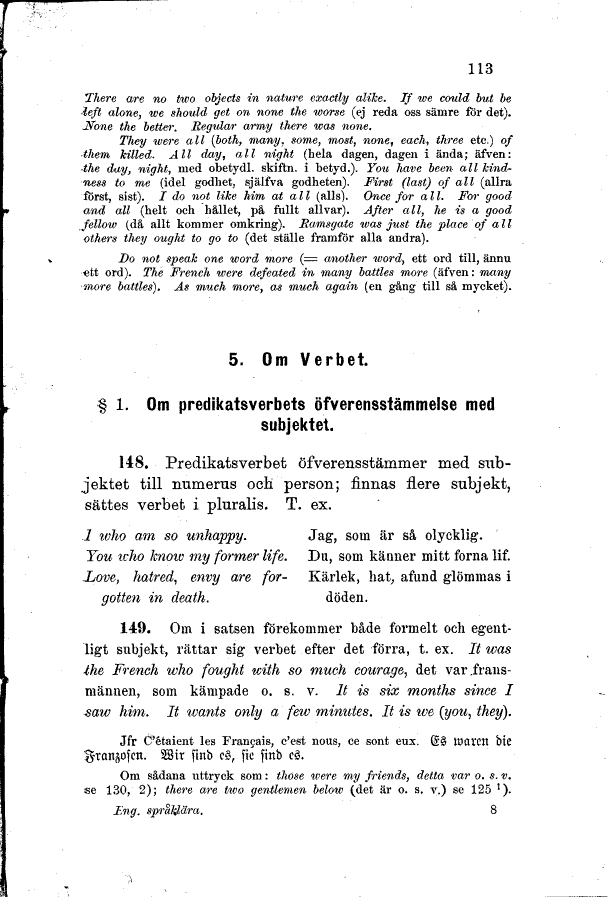
Full resolution (TIFF) - On this page / på denna sida - 4. Pronomen. - 5. Verb.

<< prev. page << föreg. sida << >> nästa sida >> next page >>
Below is the raw OCR text
from the above scanned image.
Do you see an error? Proofread the page now!
Här nedan syns maskintolkade texten från faksimilbilden ovan.
Ser du något fel? Korrekturläs sidan nu!
This page has been proofread at least once.
(diff)
(history)
Denna sida har korrekturlästs minst en gång.
(skillnad)
(historik)
113
There are no two objects in nature exactly alike. If we could but be
left alone, we should get on none the worse (ej reda oss sämre för det).
None the better. Regular army there was none.
They were all (both, many, some, most, none, each, three etc.) of
them killed. All day, all night (hela dagen, dagen i ända; äfven:
the day, night, med obetydl. skiftn. i betyd.). You have been all kindness
to me (idel godhet, själfva godheten). First (last) of all (allra
först, sist). I do not like him at all (alls). Once for all. For good
and all (helt och hållet, på fullt allvar). After all, he is a good
fellow (då allt kommer omkring). Ramsgate was just the place of all
others they ought to go to (det ställe framför alla andra).
Do not speak one word more (= another word, ett ord till, ännu
ett ord). The French were defeated in many battles more (äfven: many
more battles). As much more, as much again (en gång till så mycket).
5. Om Verbet.
§ 1. Om predikatsverbets öfverensstämmelse med subjektet.
148. Predikatsverbet öfverensstämmer med subjektet
till numerus och person; finnas flere subjekt,
sättes verbet i pluralis. T. ex.
I who am so unhappy. Jag, som är så olycklig.
You who know my former life. Du, som känner mitt forna lif.
Love, hatred, envy are forgotten Kärlek, hat, afund glömmas i
in death. döden.
149. Om i satsen förekommer både formelt och egentligt
subjekt, rättar sig verbet efter det förra, t. ex. It was
the French who fought with so much courage, det var fransmännen,
som kämpade o. s. v. It is six months since I saw him.
It wants only a few minutes. It is we (you, they).
Jfr C’etaient les Français, c’est nous, ce sont eux. Es waren die
Franzosen. Wir sind es, sie sind es.
Om sådana uttryck som: those were my friends, detta var o. s. v.
se 130, 2); there are two gentlemen below (det är o. s. v.) se 125 1).
Eng. språklära. 8
<< prev. page << föreg. sida << >> nästa sida >> next page >>